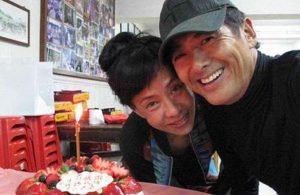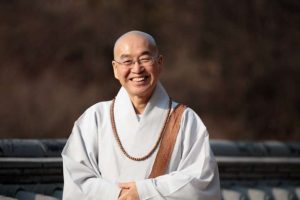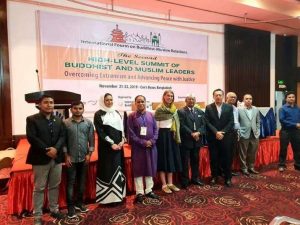
Jungto Society, the international Buddhist community founded by the revered Korean Dharma master and social activist Venerable Pomnyun Sunim (법륜스님), recently conducted its 33rd annual pilgrimage across India and to Nepal. Held under the theme “Following in the Footsteps of the Buddha,” the pilgrimage, which ran from 19 January to 2 February, was attended by more 500 practitioners.1
This year’s pilgrimage was particularly notable for two reasons: the participation, for the first time in the Jungto pilgrimage’s 33-year history, of non-Korean practitioners: the 500-plus Korean Buddhist pilgrims were accompanied nine practitioners from Italy, Japan, Thailand, the United Kingdom, the United States, and Vietnam—some of whom are members of the the International Network of Engaged Buddhists (INEB), including two bhikkhunis from Thailand, while others are graduates of Jungto Society’s English-language Dharma School.2
Significantly, the pilgrimage also coincided with celebrations for the 30th anniversary of Sujata Academy, a remarkable community school and social empowerment project established by Ven. Pomnyun Sunim in Dungeshwari, in the northeastern Indian state of Bihar, that has transformed the lives of an entire community of people who have faced systemic social and economic exclusion as a result of India’s conservative Hindu caste hierarchy.
Ven. Pomnyun Sunim established the international Buddhist humanitarian relief organization Join Together Society (JTS) as an expression of the compassion of engaged Buddhism and the belief that helping others is the best way to enrich one’s own life. Headquartered in Seoul, JTS operates four branch offices in South Korea and the United States, along with field offices in India and the Philippines. JTS Korea and JTS America oversee fundraising, while JTS India and JTS Philippines conduct development projects in cooperation with local communities. The relief organization has also earned Special Consultative Status to the United Nations Economic and Social Council (ECOSOC).
JTS India began its work in Dungeshwari, some 12 kilometers northeast of the Buddhist pilgrimage hub of Bodh Gaya, in the early 1990s, aspiring to fulfill the mission: “The hungry should eat; the sick should be treated; children should be educated in time.”
This region is surrounded by the Pragbodhi Hills where the historical Buddha, Shakyamuni, is said to have spent six years in a cave as an ascetic. And it’s here that JTS India has been working to empower the villagers in Dungeshwari to live their lives free from hunger, illiteracy, and disease.3
The people of Dungeshwari are primarily Dalits, who face systemic social and economic exclusion as a result of the conservative Hindu social hierarchy. “Dalit,” which translates as “broken” in Sanskrit, is a term for the very lowest castes, whom members of the so-called “higher” castes still to this day deem “untouchable,” despite the practice being prohibited in the Constitution of India. By working directly with disadvantaged communities, JTS aims to help them to mobilize their own capabilities and resources to create a more prosperous and sustainable future.
The 30th anniversary of Sujata Academy, which featured an abundance of guest speakers and performances by present and formers students, was held under the theme “I Will Be the Hope of the World.” The proceedings, beginning in the early morning, were held in three parts: a formal anniversary ceremony; a commemorative seminar, and a celebratory festival.
Jungto Society Dharma teacher Bogwang, the director in charge of Sujata Academy for the past nine years, expressed gratitude to the Sujata students for their diligence, to their parents, for sending their children to the school, and to the academy’s Korean sponsors, who have generously supported the project over the decades.
“When I first came to Dungeshwari, many children were begging in the streets,” Ven. Pomnyun Sunim related. “When I asked them why, they replied that there was no school. The village head, Sukhan Manji, gathered the villagers to discuss the issue of child beggars. The result of this discussion was the decision to build a school. When I reminded the villagers, ‘Because they are your children, don’t you also have to contribute something?’ 10 people agreed to contribute 10 katthas of land each.
“Then, when we gathered the young people in the village, there were two young people attending school at that time. Those two young people went on to become the first teachers under the tree before the school was built: Satyendra and Ganesh.”
The academy is named after Sujata, the young woman who is said to have nourished the ailing and emaciated Siddhartha Gautama with a bowl of milk-rice, thus ending his six years of extreme asceticism. Tuition at the academy is provided free of charge. The school’s principal goal is to educate every student in basic literacy and numeracy. Classes are taught from kindergarten to secondary level, alongside adult literacy classes and skills training. Students who wish to continue beyond elementary education and attend secondary school are required to teach kindergarteners or to help out in the onsite Jivaka Hospital in the mornings and to attend classes in the afternoon, working in the spirit of giving back to the community. The campus also includes a warehouse, a dormitory, a large playing field, and sports equipment for the children.
“As we have seen today, Sujata Academy was made possible by the combined efforts of everyone: village residents provided their own land, young people from nearby communities came to volunteer, and even youths from faraway Sankasia came to help us,” Ven. Pomnyun Sunim observed. “Students here have taught each other, seniors taught juniors, and from Korea, more than 150 people volunteered for periods ranging from a year to more than 10 years. All of these factors came together to bring us to this point today.
“Although the human body is made up of many interdependent organs, most people find it easier to recognize only the face. But in reality, no part of the body should be missing. While I have played the role of a face, it is only due to the efforts of many, many people that Sujata Academy has reached where it is today. I sincerely thank everyone who has volunteered, worked, and labored so long and hard. I want to dedicate this day to all those who have contributed.”
Among the special guests participating in the event were: Korean Consul-General to India Song Jin-hwa; Nand Kishore Yadav, a former cabinet minister for Bihar; and Bhikshu Pragyadeep, head of the All India Bhikshu Sangha. Also in attendance for the memorable occasion was the founder of the International Network of Engaged Buddhists (INEB) and venerable leading light of the global socially engaged Buddhism movement, Prof. Sulak Sivaraksa.4
“I’ve known Ven. Pomnyun Sunim for at least 20 years now, and I first visited Sujata Academy 15 years ago,” Prof. Sulak recalled. “It has expanded a great deal in that time, with many more students. But it’s clearly much more than a material expansion: Ven. Pomnyun Sunim is a man of quality and he works with compassion. One of the most significant aspects of Sujata Academy is that Sunim has involved the local people in this project, and as a result they feel that this project belongs to them; it’s a part of their community. I think that this was the best way forward.
“I feel strongly that to keep the teachings of the Buddha alive today, each of us needs to be involved with society. It’s not enough just to seek to liberate oneself; we need to care more about others, particularly the oppressed. So I’m very proud of Ven. Pomnyun Sunim’s work—he’s doing wonderful things for the betterment of society.
“Although I can’t say I feel positive about the future, I’m still optimistic,” Prof. Sulak told BDG. “Personally, I like to learn more from the young; I think that the young can teach us so many things if we only give them time and observe them and respect them. Only then will they feel comfortable seeking our advice; if you go and preach at them, they won’t want to listen.
“I’m very proud of the young people with whom we work. Even in my country [Thailand], although many of them don’t practice the teachings of the Buddha, the young people have become more and more socially engaged, challenging oppression and institutional corruption.”
Jungto members and local residents gathered to hear touching tributes from the volunteers and representatives of volunteers from India and Korea whose lives and work have transformed the lives and futures of so many others. Indeed, the impact of Sujata Academy has extended far beyond the vital work of educating the region’s children.
Since the establishment of Sujata Academy, most of the local children have graduated from elementary school, nearly eradicating illiteracy. The focus has since shifted to providing assistance in areas such as medical and healthcare and village development. From 2004–23, Jivaka Hospital has provided medical assistance to many tens of thousands of people, and introduced systems for managing tuberculosis, maternal health projects, the provision of hygiene and health education for pregnant women, and has significantly reduced infant mortality rates.
Even access to clean water, an essential human right, has been assured through the installation of 59 community hand pumps over 30 years, along with agricultural pumps to assist villagers in farming.
The key to this seeming miracle of social transformation has been the compassion and dedication of countless volunteers. Thanks to their work and commitment, children who once begged for alms on the streets were able to receive an education, and were empowered to become teachers and staff in schools, hospitals, and in village development projects. Sujata Academy is living proof that children, even from Dungeshwari, can embody hope for the future of the world.
Ven. Pomnyun Sunim shared some parting thoughts:
“Thank you to all the villagers who have watched over us for the past 30 years. Thank you to everyone from Bodh Gaya who supported us. Thank you to all the consistent financial supporters in Korea. A special thanks to Prof. Sulak Sivaraksa for traveling to attend this ceremony, despite his age. Also, thank you to the consul-general of the South Korean Embassy for coming in person. Many volunteers who have served at Sujata Academy took the time to visit here during their busy schedules to commemorate this 30th anniversary. Thank you once again!
“Students! You can study thanks to the efforts of so many people. Please send your applause to all those who helped you study. Children who used to beg on the streets are now students at Sujata Academy. How much have they changed? This is the power of education.
“The Buddha taught us that anyone, regardless of class or gender, can become a great person through education and awakening. So, don’t be discouraged, live confidently like the Buddha did. I will continue to be with you in the future. Thank you!”
Ven. Pomnyun Sunim is a widely revered Korean Dharma teacher, author, and social activist. He has founded numerous organizations, initiatives, and projects across the world, among them: JTS Korea, an international humanitarian relief organization working to eradicate poverty and hunger; Jungto Society, a volunteer-based community founded on the Buddha’s teachings and dedicated to addressing modern social issues that lead to suffering; Ecobuddha, an organization focused on environmental ethics and sustainable living based on the teachings of the Buddha; and Good Friends, which promotes reconciliation and cooperation between the North and South Korea, and provides humanitarian aid to North Koreans. Ven. Pomnyun Sunim also works closely with the International Network of Engaged Buddhists (INEB).
In October 2020, the Niwano Peace Foundation in Japan presented the 37th Niwano Peace Prize to Ven. Pomnyun Sunim in recognition of his international humanitarian work, intensive environmental and social activism, and his tireless efforts to build trust and goodwill between communities of different faiths and cultures, toward the goal of world peace.5

3 The Hungry Should Eat: JTS Brings Buddhist Compassion and Relief to India (BDG)
4 INEB Celebrates the 90th Birthday of Exemplar of Engaged Buddhism Sulak Sivaraksa (BDG)
5 Buddhist Monk Ven. Pomnyun Sunim Awarded the 37th Niwano Peace Prize (BDG)
See more
Pomnyun
Jungto Society
International Network of Engaged Buddhists (INEB)
Related news reports from BDG
Engaged Buddhism: Ven. Pomnyun Sunim and JTS Volunteers Bring Education to Underprivileged Communities in the Philippines
Engaged Buddhism: Ven. Pomnyun Sunim Shares the Warmth of Compassion with Vulnerable Communities in Korea
Ven. Pomnyun Sunim Joins Religious Leaders in Interfaith Peace Declaration on 70th Anniversary of Armistice on the Korean Peninsula
Pathways to Peace: Ven. Pomnyun Sunim Delivers Talk on Rising Tensions on the Korean Peninsula
Engaged Buddhism: Ven. Pomnyun Sunim Joins JTS Korea Volunteers for Humanitarian Relief Work in Türkiye
Engaged Buddhism: JTS Korea Distributes Humanitarian Aid in Pakistan
Engaged Buddhism: Ven. Pomnyun Sunim and JTS Volunteers Bring 100,000 Gas Stoves to Rohingya Refugees in Bangladesh
Engaged Buddhism: Ven. Pomnyun Sunim Shares the Fruits of Compassion to Mark the Birth of the Buddha
Engaged Buddhism: Ven. Pomnyun Sunim Delivers Compassion to the Vulnerable in Korea
Engaged Buddhism: Jungto Society Delivers Compassion for the Vulnerable in Korea
Engaged Buddhism: JTS Korea Distributes Emergency Flood Relief in Cambodia
Related features from BDG
Living a Life without Suffering
Live Life Lightly
Prostrating as a Part of Buddhist Practice
Suffering and the Significance of Insignificance
Treasure the Present and Value Your Own Life
Free Will and Freedom from Suffering
Do Not Sacrifice Later for Now
Begin Life Now
Becoming the Master of Your Own Life
You Are Alive Today
Everyone Has the Right to be Happy
Personal Action to Mitigate the Climate Crisis
Awareness, the Beginning of Change
How to Live Life More Freely
Related videos from BDG
Dharma Q+A with Ven. Pomnyun Sunim
Wisdom Notes from Ven. Pomnyun Sunim




































